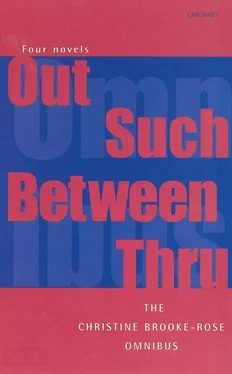— Let’s go and interview her, you and I.
— Is she not beautiful in any circumstances?
— We’ll ask her.
— She can’t hear, under the helmet.
— She will remove the helmet when she sees the microphone. She loves me, you see.
Mrs. Mgulu sits graciously at the dressing-table, taking an interest in the crackling electricity of her hair which is being brushed into sleekness by the small dark man in candy-stripe trousers, whose profile is reversed in the mirror. His hands are delicate with pale pink nails and his brown lips pout in concentration. On the other side of the dressing-table is another dressing-table which faces the other side of the mirror. There a pert Bahuko girl in an orange overall dresses the hair of a guest who is hidden by the two-sided mirror. As she works she glances into the mirror at the results. Even her long brown hands are visible, with their golden nails, but the guest’s head is hidden by the raised square mirror. From this position to the right of Mrs. Mgulu the Bahuko girl looks as if she were dressing the hair of Mrs. Mgulu’s image who faces Mrs. Mgulu on this side of the mirror. Mrs. Mgulu’s hair is being dressed by two live people, an Asswati in candy-stripe dressing her real hair, and a Bahuko girl in orange, dressing her reflected hair. Mrs. Mgulu does not know this, for she cannot see the Bahuko girl. In the square wooden-framed mirror her own smooth Asswati face smiles at her reflection with self-love in the round black eyes and in the well-curved lips, but occasionally with graciousness at the reflection of the Asswati with delicate hands, who pouts his mouth pursed in concentration. The smiling black eyes shift a little to the left, with graciousness, and then a little to the right, with self-love. A psychoscope might perhaps reveal the expression to be one of pleasure in beauty, rather than self-love. And then a little more to the right. The last marbled thermoplastic tile is glueing nicely, purple, streaked with pink. Sooner or later some interruption will be inevitable, a movement will have to be made, a finishing of the task, a declaration that the activity, the heat, the motion of colours and the concrete feel of tools and materials are over. You people are all the same, the task has taken far too long. The big ball is practically on us and the salon is only just finished, it’s all very well but it has been one long headache. You’re all as lazy and unreliable as one another.
— and Lilly’s very worried about you.
The eyes strike deep, a rich chromatic chord, the scent of hair-lacquer fills the corridor. The alexandrite in the left nostril is replaced by a small gold flower on a chain that climbs over the nose and loops gently along the cheek into the hair just above the right ear. Follow me, she said, I want a word with you outside. The conversation is real, repeat real. She leans her bare black arms against the golden banisters. Follow me, she said, tapping him on the shoulder, I want a word with you outside and now the golden banisters go curving down behind her, a sort of crown in depth, a spiral gown, a chrysalis.
— She was upset about the infidelity of course, anyone would be, but these things happen and she understood. Anyway it’s none of my business. But your capacity to work is my business. I’m your employer, for the time being anyway, and I’ve taken an interest in you, for Lilly’s sake at least. I’m very fond of Lilly. She practically brought me up and I owe a lot to her. She’s been with me ever since, I know her as I know my right hand, and she’s very unhappy about you. I’ve been watching you in there. You’re dreaming half the time. Oh I know the other workers are no better, it’s understandable, they want to make the job last, but still, time isn’t elastic.
— It’s because of there being no past, and no future, ma’am, it’s so difficult, living in the present.
— I see you’ve been talking to Mr. Swaminathan.
— You fed on our past, you see, and drained us, now you deny the past but need to remind us, it’s an empty ritual for you, a weakness. But it hurts.
— You don’t want to believe everything Mr. Swaminathan says, you know.
— That too is one of the things he says.
— Yes. He belongs to the rope-trick tradition, which can be as unhealthy as — well, you know what I mean. I think I should send you up to the hospital to be psychoscoped.
— Oh, no!
— Why, what’s the matter? It’s a very rapid treatment, quite painless and it does the world of good. It’s a privilege, too.
— Not … the Colourless Hospital?
— You speak so low. I can’t hear.
— Did you mean the Colourless Hospital?
— The—? But we don’t have segregation here, we’re a multi-racial society. Exalting all colours to the detriment of none, don’t you know your slogans? Good heavens, I do believe you really are living in the past … Tell me, does it hurt?
— Yes.
— You’re in a bad way, aren’t you?
The dress is mauve. The shining black hair is coiled up high and smells of fixative. The small gold chain loops gently over the nose and the banisters weave circles around her.
— Come with me, I’ll give you a letter.
The banisters weave circles round them both.
— Then you can go back and sweep up the mess before you leave. It’s all got to be spick and span by tomorrow.
The banisters weave circles.
— Steady! Are you all right? You can’t faint on my stairs, you know. I would send you with Olaf, my chauffeur, but I need him to go and open the Famine Bazaar. Are you taking those pills I gave Lilly? They’re better than the Government ones and they’re rather hard to come by. Wait here.
Whereas no amount of positive evidence. We can make our errors in a thought, and reject them in another thought, leaving no trace of error in us. No evidence at all is needed for a certainty acquired by revelation. Yes, but what relation does it have to the real thing? The number of molecules in one cubic centimetre of any gas, at sea-level pressure and at a temperature of fifteen degrees centigrade, is approximately twenty seven million million million, and each molecule can expect five thousand million collisions per second. Mrs. Mgulu emerges from the bedroom door, wearing something diaphanous. Classical physiology tolerates only one unknown quantity at a time in any investigation and that quantity shall be Mrs. Mgulu. Come in, she says, I want you to read this letter and see if it’s all right. Oh, stop it, you know very well this dialogue will not occur. We don’t have segregation here, oh I know it looks like it, but you’re selecting the facts, I do assure you we’re a multi-racial society. Come in, she says, and I’ll show you. I’ve always loved you, right from the very beginning I’ve loved you. You’re living in the past aren’t you, but now is the time for the beginning.
— Here we are, you go to the Hospital and give them this letter, they’ll get you back into focus. It’s all a question of restoring the equilibrium. But first go up and tidy the mess in the salon. It must all be spick and span by tomorrow. You’re feeling all right, aren’t you?
The dress is mauve, the shining hair is coiled up high and smells of fixative. The small gold chain loops gently out of the left nostril over the nose and cheek. The eyes strike deep, a rich chromatic chord that echoes in the blood long after it has come and gone.
The salon is empty. The thermoplastic marbled tiles are scattered with dust and bits of plaster. In the corner the small funeral pyre of hair has been left, grey with mingled dust. The banisters weave circles. Go to the Hospital and give them this letter. They will restore the equilibrium. They will weigh you in the balance and find you wanting.
Читать дальше












